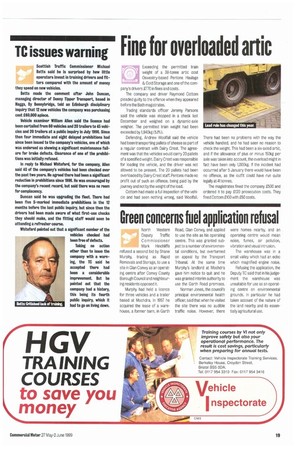Scottish Traffic Commissioner Michael Betts said he is surprised by
Page 21

If you've noticed an error in this article please click here to report it so we can fix it.
how little operators invest in training drivers and fitters compared with the amount of money they spend on new vehicles.
Betts made the comment after John Duncan, managing director of Denny Tipper Transport, based in Daggs, By Bonnybridge, told an Edinburgh disciplinary inquiry that 12 new vehicles the company was purchasing cost 00,000 apiece.
Vehicle examiner William Allen said the licence had been curtailed from 60 vehicles and 20 trailers to 45 vehicles and 20 trailers at a public inquiry in July 1996. Since then four immediate and eight delayed prohibitions had since been issued to the company's vehicles, one of which was endorsed as showing a significant maintenance failure for brake defects. Clearance of one of the prohibitions was initially refused.
In reply to Michael Whiteford, for the company, Allen said 40 of the company's vehicles had been checked over the past two years. He agreed there had been a significant reduction in prohibitions since 1996. He was encouraged by the company's recent record, but said there was no room for complacency.
Duncan said he was upgrading the fleet. There had been five S-marked immediate prohibitions in the 12 months before the last public inquiry, but since then the drivers had been made aware of what first-use checks they should make, and the fitting staff would soon be attending a refresher course.
Whiteford pointed out that a significant number of the vehicles checked had been free of defects.
Taking no action other than to issue the company with a warning. the IC said he accepted there had been a considerable improvement. But he pointed out that the company had a history, this being its fourth public inquiry, which it had to go on living down.
























































































































